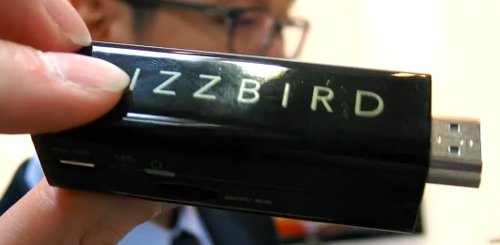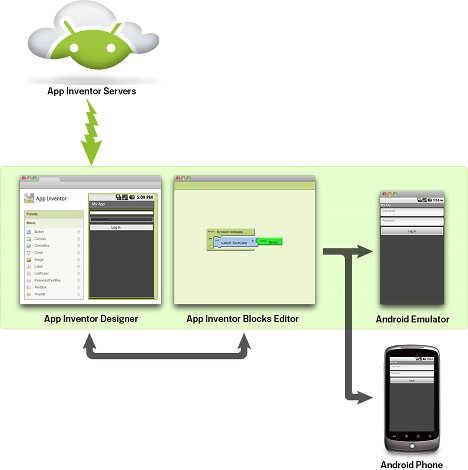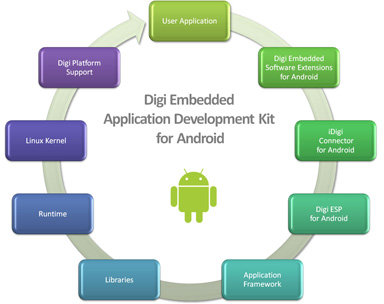Valueplus, a Korean company specialized in “media application products”, is currently showcasing the Valueplus Tizzbird N1 at CeBit 2012, in Hanover, Germany on March 6-10 2012. This device is a media player in a small form factor HDMI / USB stick similar to what we have previously seen with the Roku Streaming Stick, Always Innovating HDMI Dongle Media Player and FXI Tech Cotton Candy. The Tizzbird N1 is powered by Telechips 8925 ARM Cortex A5 processor (TCC8925C) clocked at 800 Mhz with 4 GB NAND Flash and runs Android 4.0 (ICS). The device features an HDMI port, a mini USB port for power, a USB port to connect external mass-storage devices such as a USB hard drive, a microSD card slot and an IR sensor. The device also has built-in Wifi 802.11n for network connectivity. The way it works is you plug the stick into the HDMI port of your TV […]
Google Replaces Android Market with Google Play
Google has just announced the launch of Google Play, an update (and replacement) for the Android Market that gives access to apps, books, movies, and music to users on Android devices and to anyone on the Web. Google expects Google Play to drive more traffic and revenue to the entire ecosystem, including app and games developers. Google also explains there are almost no changes for existing users and developers: Google Play is built on the same infrastructure as Android Market, so the transition for users and developers will be seamless. Users can sign into their existing accounts with the same credentials as before and purchase content using the same payment methods. As a developer, there’s no change needed to your published products and you can continue to use the same publishing tools to put your app in front of hundreds of millions of Android users. If your app was in […]
MIT Announces App Inventor Open Beta Preview
At the end of 2010, Google Introduced App Inventor, a web based tool allowing non-programmers to easily design Android applications, before phasing it out at the end of 2011. Google eventually made App Inventor open source and it is now handled by the Massachusetts Institute of Technology (MIT) which planned to make a beta version of App Inventor available to the general public in Q1 2012. This happened yesterday, as the MIT App Inventor service is now open to everyone and all you will need is a Google ID for log-in such as a gmail account. There is no need to install any software as was the case with the original version of App Inventor and everything is handled in the web browser. Since this is the first release, MIT explains that there may be issues due to the load from a large number of users and there may be […]
Raspberry Pi Releases Arch Linux SD Card Image
The Raspberry Pi Foundation has just announced the release of Arch Linux for the Raspberry Pi. This image is based on a minimal image of Arch Linux and does not come with a graphical interface. This distribution may not be suitable for beginners and you may be better off using the Debian SD Card image or even the upcoming Fedora 14 Raspberry Pi Remix image. You can always install extra packages with Pacman, the Arch Linux package manager. To update the package list:
|
1 |
pacman -Syu |
To Install LXDE Graphical Interface:
|
1 |
pacman -S lxde xorg-xinit xf86-video-fbdev |
To run LXDE:
|
1 |
xinit /usr/bin/lxsession |
You can download it using BitTorrent: archlinuxarm-01-03-2012.zip.torrent (preferred method) or via one of the HTTP mirrors: archlinuxarm-01-03-2012.zip. (This link will redirect your download to the closest available HTTP server). The default login credentials are: root/root I haven’t tried it, but you should be able to use this release in qemu, by following instructions similar to the one […]
Digi International Unveils Embedded Application Development Kit for Android
Digi International has released its Application Development Kit for Android (the world first Android embedded application devkit according to the company) at Embedded World 2012. This Development Kit is comprised of both software and hardware components. The software development kit (SDK) includes drivers and Digi software extensions to create Android-based applications on embedded platforms while eliminating tedious driver development work. The kit also includes one of 2 Digi Wireless modules based Freescale i.MX51 (ConnectCore Wi-i.MX51) and i.MX53 (ConnectCore for Wi-i.MX53). The complete Digi Android development kit includes: Quick start guide Digi Application Development Kit for Android CD/DVD Documentation and development board schematics ConnectCore Wi-i.MX53 module – 1 GHz Freescale i.MX53, 512 MB NAND Flash, 512 MB DDR2, -20 to +70° C. 7″ WVGA LCD panel with touchscreen Digi JumpStart Kit development board: 3 serial ports (1 x RS-232/422/485, 1 x RS-232 Tx/Rx, 1 x TTL) VGA and HDMI 1.3 video outputs […]
Rockchip Introduces RK30xx Dual Core Cortex A9 Processors for Low Cost Tablets
Rockchip announced their next generation mobile processor at Mobile World Congress, in Barcelona, Spain. The Rockchip RK30xx series (RK3018?) features a dual core Cortex A9 clocked up to 1.4 GHz coupled with an ARM Mali-400 GPU and targets low cost Android 4.0 tablets. The Rockchip RK30xx platform features: Dual-core ARM Cortex-A9 processor with up to 1.4GHz speed, implemented with Artisan Processor Optimization Pack (POP) Quad-core ARM Mali-400 MP GPU, supporting OpenGL ES 1.1/2.0 and OpenVG 1.1 Full memory support, including DDRIII, DDRII, and LPDDRII High performance dedicated 2D processor 1080P multi-format video decoder 1080P video encoding for H.264 and vp8 Stereoscopic 3D H.264 MVC video codec Embedded HDMI 1.4a, supporting 3D display Embedded 60bit/s ECC, supporting MLC NAND, E-MMC, i-NAND and booting Support of dual panel display and dual camera Rockchip also said the complete BSP is already available for the chip. This company does not usually release BSP publicly […]
How to Install Windows 8 in Linux with QEMU
Microsoft has just released Windows 8 Consumer Preview. Here’s a method to install Windows 8 in Linux using KVM and Qemu. You can use this beta version of Windows 8 until the 15th of January 2013, after which it will be unusable. Here are the requirements to install Windows 8: 1 GHz Processor or greater 1 GB RAM 20 GB free storage for the 64-bit version Before you start, make sure your processor supports Intel Virtualization Technology (VT) or AMD’s AMD V CPU virtualization extensions. Type this command to check vmx or svm flags:
|
1 |
egrep --color "(vmx|svm)" /proc/cpuinfo |
If this is the case, you can install KVM. Type the following command for RPM-based distributions such as Fedora:
|
1 |
sudo yum install kvm |
or the following command for Debian or Ubuntu:
|
1 |
sudo apt-get install qemu-kvm |
Then download the ISO image of Windows 8 on Microsoft website (64-bit version) :
|
1 |
wget http://iso.esd.microsoft.com/WCPDL/BD1B8A49393E30CC9C4E5C88457D73E964F1F3B18/Windows8-ConsumerPreview-64bit-English.iso |
Create a 20 GB virtual hard drive to install Windows 8: […]
Free Electrons Releases Embedded Linux Training Materials
Free Electrons, a technology company offering embedded Linux consulting services as well as embedded Linux training, has released their training materials for Linux and system development for embedded systems including their Lab sessions. The training materials are available in their git repository in LaTeX format. If you want the latest documentation in PDF, you’ll need to build it by following those steps: Install the required packages:
|
1 |
sudo apt-get install git dia inkscape texlive-full python-pygments |
Get the embedded Linux slides source:
|
1 |
git clone <a href="git://git.free-electrons.com/training-materials.git">git://git.free-electrons.com/training-materials.git</a> |
Build the training materials:
|
1 2 3 4 |
cd training-materials make full-sysdev-labs.pdf make full-kernel-labs.pdf make full-sysdev-slides.pdf |
The last three commands will generate the PDF files respectively: full-sysdev-labs.pdf – Embedded Linux Training Lab Book (58 pages) with instructions for the IGEPv2 board based on on TI DM3730 or OMAP3530. full-kernel-labs.pdf – Linux kernel and driver development training Lab Book (37 pages) full-sysdev-slides.pdf – Embedded Linux system development presentation slides (506 pages) Free Electrons also have slightly older version of full-kernel-labs.pdf and full-sysdev-slides.pdf available for download as PDF so […]








